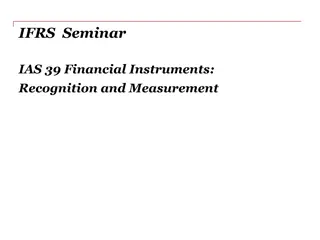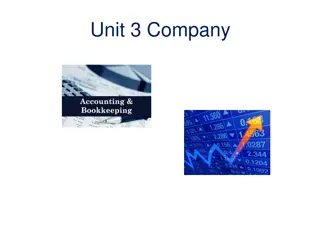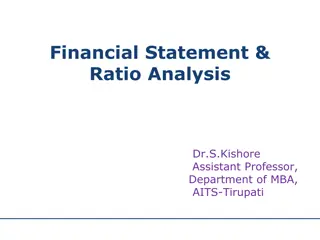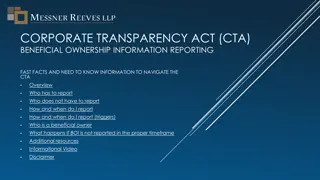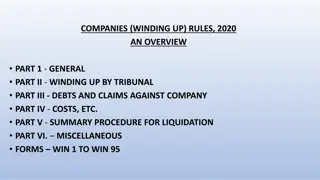Important Provisions of Companies Act Regarding Audit
The Companies Act mandates specific provisions related to audit, including the appointment of auditors, consent, certificates, and rotation requirements. Companies need to appoint auditors timely, obtain consent and eligibility certificates before appointment, and adhere to mandatory auditor rotatio
2 views • 22 slides
National Financial Education Strategies and Best Practices
Financial education plays a crucial role in empowering individuals and ensuring financial system stability globally. The National Strategies for Financial Education (NFES) endorsed by the G20 have been adopted by approximately 100 countries. Different approaches such as stand-alone strategies, multi
5 views • 34 slides
Blog 2- Unveiling the Top RPO Companies in the USA_ Elevate Your Recruitment Strategy
In the competitive landscape of talent acquisition, companies are increasingly turning to Recruitment Process Outsourcing (RPO) providers to streamline their hiring processes and gain access to top talent. With a myriad of RPO companies in the USA, it can be challenging to identify the best partners
6 views • 2 slides
How to achieve financial freedom in 5 years
Welcome to the Financial Freedom Challenge!\nAre you ready to take control of your financial future and unlock the door to lasting prosperity? Join us on a journey toward financial freedom like no other.\nWhat is the Financial Freedom Challenge?\nThe Financial Freedom Challenge is a transformative p
0 views • 9 slides
BTW FINANCIAL SERVICES & IMF PRIVATE LIMITED
About BTWIMF :-\nAt BTW IMF, our dedicated team of dedicated financial advisors operates with utmost professionalism, unwavering integrity, and a commitment to innovation. As experienced financial consultants, we excel in delivering a diverse range of financial products and services tailored to meet
4 views • 1 slides
Understanding Financial Leverage and Its Implications
Financial leverage refers to a firm's ability to use fixed financial costs to amplify the impact of changes in earnings before interest and tax on its earnings per share. It involves concepts like EBIT, EBT, preference dividends, and tax rates, and can be measured through the degree of financial lev
1 views • 7 slides
Financial Empowerment through the Allstate Foundation Curriculum
Explore the Allstate Foundation's Moving Ahead Curriculum on financial empowerment, focusing on Module 4 that covers building financial foundations, loan options, and organizing financial paperwork. Understand the importance of loans, documentation, and financial records for establishing a strong fi
0 views • 25 slides
Understanding Financial Economics and Its Importance in Markets
Financial economics is a branch of economics focused on the distribution of resources in uncertain markets. It involves making decisions considering future events and creating models to analyze variables affecting decisions. Key aspects include working out portfolio risks and utilizing financial ins
0 views • 129 slides
A Primer on Financial Ratio Analysis and CAHMPAS
This resource by the CAHMPAS Financial Team at University of North Carolina provides an in-depth look into financial ratio analysis, including the theory, types of analyses, and the importance of understanding financial indicators. It discusses how businesses can assess their financial performance a
0 views • 87 slides
Banking Regulations in Bangladesh: A Comprehensive Overview
The Bangladesh Bank Order of 1972 established the central bank, Bangladesh Bank, which regulates banking activities under the Bank Companies Act of 1991. This legislation, along with the Financial Institutions Act of 1993, sets the framework for overseeing bank companies and non-banking financial in
0 views • 27 slides
Understanding Different Types of Companies in Business
Explore the various kinds of companies in the business world, including statutory companies, registered companies, private companies, public companies, and more. Learn about the differences between private and public companies, statutory company examples like LIC and RBI, and the characteristics of
0 views • 25 slides
Albanian National Financial Education Strategy 2022-2027
The Albanian National Financial Education Strategy (NFES) aims to promote financial education for individuals, households, and MSMEs to enhance financial well-being and economic stability. It focuses on key interventions, foundational enablers, institutional coordination, funding, and monitoring. Fi
0 views • 19 slides
Understanding Internal Financial Controls and Regulatory Mandates
This content provides insights into Internal Financial Controls (IFC) and its significance in ensuring efficiency, fraud prevention, accuracy in accounting, and timely financial reporting. It also delves into regulatory mandates under the Companies Act of 2013, specifying requirements for auditors'
0 views • 19 slides
Understanding Financial Statements Analysis in Business Finance
Understanding the analysis of financial statements is crucial for assessing the financial performance and position of an organization. This course provides knowledge, competencies, and skills necessary to apply basic financial statement analysis techniques, interpret financial numbers, and generate
0 views • 18 slides
Understanding IAS 39: Financial Instruments Recognition and Measurement
This content provides an overview of an IFRS seminar on IAS 39, focusing on key concepts such as the classification and measurement of financial assets, impairment, reclassification, and more. It covers definitions of financial instruments, financial assets, equity instruments, and financial liabili
1 views • 43 slides
Insights into the Biotech Industry: Companies, Key Players, and Career Pathways
Keith Ho's career journey from a scientist to a digital health expert at Biogen is highlighted. The overview covers the definition of biotech, the concentration of biotech companies in the US, and the global distribution of such companies. Additionally, key insights into the top biopharma companies
0 views • 9 slides
An Overview of Different Types of Companies and Their Characteristics
Explore the various kinds of companies based on mode of incorporation, number of members, liability of members, and more. Learn about statutory companies, registered companies, private companies, and the distinctions between different types of companies in the business world.
0 views • 25 slides
Updated Disclosure Rules for Financial Relationships in Continuing Education
ACCME updated its Standards for Integrity and Independence in Continuing Education, requiring disclosure of financial relationships with specific "ineligible companies" by all involved parties. The rules aim to enhance transparency and mitigate conflicts of interest in accredited continuing educatio
1 views • 5 slides
Enhancing Financial Inclusion Through Digital Solutions
This project, implemented by GIZ with funding from the German Federal Ministry for Economic Cooperation and Development, aims to improve access to digital payments and financial services for refugees and low-income Jordanians. Key objectives include increasing the usage of digital financial services
0 views • 11 slides
Understanding Financial Abuse and Building Healthy Financial Relationships
Explore the impacts of financial abuse within relationships and learn about elements of a healthy financial partnership. Gain insights into recognizing signs of financial abuse, establishing financial safety, and fostering equality in decision-making. Understand how financial empowerment plays a vit
0 views • 30 slides
St. John's College Cambridge Annual Financial Review 2015/16 - Summary and Analysis
This confidential Annual Financial Review for the Fellows of St. John's College, Cambridge provides detailed insights into the financial performance and outlook for the year 2015/16. It covers the income, expenditure, endowment, and school finances of the College group. The review discusses the oper
0 views • 35 slides
Characteristics of Companies in the Care Sector
Companies operating in the care sector exhibit distinct characteristics, such as financial prioritization, control by financial experts, and reliance on technology. Large care chains engage in takeovers and have offshore accounts, while smaller companies face asset stripping and profit maximization
0 views • 5 slides
Understanding Listed Companies and Financial Reporting
Listed companies are publicly traded entities whose shares are available on stock markets. They are required to submit annual accounts and reports, including key financial statements like the balance sheet and profit and loss account. The annual report provides insights into the company's financial
0 views • 28 slides
Practical Aspects of Strike Off and Restoration of Companies by CS Ashish O. Lalpuria
This presentation discusses the practical aspects of striking off and restoring companies based on analysis of case laws from NCLT and NCLAT. It covers types of strike off, companies that cannot be struck off by ROC, and the process of strike off by the Registrar of Companies. Various scenarios and
0 views • 44 slides
Financial Literacy Empowerment in Eastern and Southern Africa
Developing countries in Eastern and Southern Africa are prioritizing financial education to empower consumers in making sound financial decisions. Financial literacy enhances financial inclusion, stability, and economic growth. It involves awareness, knowledge, skills, attitudes, and behaviors essen
0 views • 23 slides
Overview of Limited Liability Companies under Polish Company Law
Explore the legal aspects of limited liability companies under the Polish Commercial Companies Code, detailing formation, share capital requirements, shareholder liabilities, and powers granted to these entities. Learn about the two main types of companies in Polish law, their characteristics, and k
0 views • 13 slides
The Foundations of the Separation of Powers in Companies
The separation of powers in companies is based on the dualism of organs: the Board and General Meeting. The actual situation in companies diverges between large public companies with autonomous management and smaller private companies with owner-operators. The search for the foundations of the separ
0 views • 15 slides
Understanding Why Financial Institutions Exist
Financial institutions exist to provide crucial services like intermediation, risk management, and facilitating economic activities by connecting savers and borrowers. The global financial structure involves various institutions like banks, insurance companies, and securities markets. Key facts incl
0 views • 45 slides
Types of Companies in Corporate Administration
This article discusses the various kinds of companies in corporate administration, including incorporated, chartered, statutory, and registered companies. It covers the definition of a company, different types of legal entities, and examples of each type. The classification of companies based on inc
0 views • 17 slides
Understanding Financial Statements and Income Statement Analysis
The financial statement analysis covers the overview of financial statements, the importance of uniform financial standards for evaluating companies, and a breakdown of the income statement for Celerity Technology Inc. (CTI) in Year 1 and Year 2. The analysis focuses on key metrics such as revenues,
0 views • 35 slides
Understanding Financial Statement and Ratio Analysis
This informative content discusses the importance of financial statement and ratio analysis in assessing a firm's past, present, and future financial conditions. It covers the primary tools used, such as financial statements and comparison of financial ratios, as well as the objectives of ratio anal
0 views • 35 slides
Financial Literacy and Education Commission: Coordinating Federal Efforts
Financial capability empowers individuals to manage financial resources effectively, make informed choices, avoid pitfalls, and improve their financial well-being. The Financial Literacy and Education Commission (FLEC) works to improve the financial literacy of individuals in the United States throu
0 views • 16 slides
Efic: Specialist Financing Solutions for Australian Companies
Efic is a specialist financier owned by the Australian Government, providing creative financing solutions to help Australian companies succeed globally. They offer various financial instruments like bonds, guarantees, and loans to assist companies in winning contracts and expanding internationally.
0 views • 11 slides
Corporate Transparency Act (CTA) Beneficial Ownership Reporting Requirements
The Corporate Transparency Act (CTA) mandates companies to report information about their beneficial owners to FinCEN starting January 1, 2024, to combat illicit activities. Reporting companies include U.S.-based corporations, LLCs, and foreign companies registered to do business in the U.S. Exempt
0 views • 10 slides
Understanding Borrowing Powers of Companies under Companies Act, 2013
The term "Borrowing" in the Companies Act, 2013, pertains to the power granted in Section 180(1)(c) for companies to borrow money with the consent of the company by a special resolution. This includes provisions on limits, definitions of temporary loans, necessary board resolutions, and validity of
1 views • 8 slides
Challenges in Financial Reporting and Regulation amidst Financial Engineering
Efforts to establish effective regulatory standards in accounting and financial services have often fallen short in the face of financial engineering advancements. This article explores the reasons behind these failures, including the inability of regulations to keep up with innovative financial pra
0 views • 65 slides
Companies (Cost Records and Audit) Amendment Rules 2014 Overview
The Companies (Cost Records and Audit) Amendment Rules 2014, presented by CMA Harshad S. Deshpande, cover the applicability of cost records and cost audit for companies in regulated and non-regulated sectors. The rules specify the class of companies engaged in production or services that must mainta
1 views • 41 slides
Understanding Financial Literacy and Its Importance
Financial literacy is crucial in today's society as it involves knowledge of financial concepts, skills to make effective decisions, and confidence in financial matters. This module explores the definition of financial literacy, its importance for young people, and the impact of financial literacy a
0 views • 20 slides
Understanding Growth Companies and Growth Stocks
Differentiating between good companies and good investments, this content delves into the intrinsic value versus market value of stocks, the characteristics of growth companies and growth stocks, and how stock prices can be undervalued or overvalued in the market due to incomplete information. It em
0 views • 38 slides
Companies (Winding Up) Rules, 2020: An Overview
The Companies (Winding Up) Rules, 2020 provide guidelines for winding up a company by the Tribunal under the Companies Act, 2013. The rules cover various aspects such as modes of winding up, circumstances under which a company may be wound up by the Tribunal, definitions, forms, and more. It specifi
1 views • 110 slides














